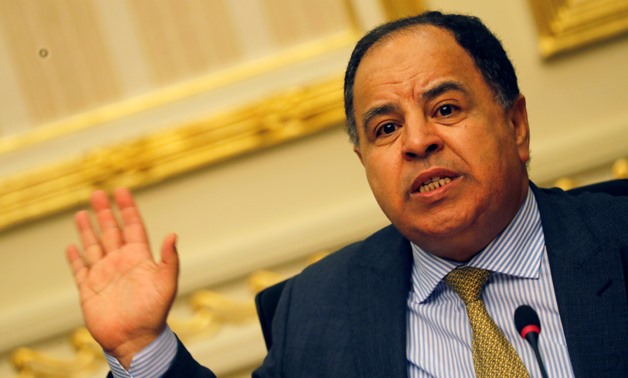
FILE PHOTO: Egypt's Finance Minister Mohamed Maait gestures during a news conference in Cairo, Egypt July 17, 2019. REUTERS/Amr Abdallah Dalsh/File Photo
CAIRO - 20 April 2022: Egypt achieved a primary surplus of 1.46 percent of the gross domestic product (GDP), which was used to finance part of the interests of the public debt, which contributed to reducing the total deficit to 7.4 percent of GDP, according to Minister of Finance Mohamed Maait.
Maait pointed out that the volume of public spending on social dimension programs increased in the 2020-2021 budget, which led to an increase in the total expenditures of the 2020/2021 fiscal year by 10 percent to reach LE 1.6 trillion.
He explained that the results of the final account of the 2020/2021’s budget reflect the bias of the political leadership to the most favored groups by adopting social dimension policies, as public spending on wages and workers’ compensation rose to LE 318.8 billion, compared to LE 288.8 billion in the 2020-2021 fiscal year, with a growth rate of 10.4 percent.
Expenditure on subsidizing food commodities rose to LE 83 billion, compared to LE 80.4 billion in the 2020-2021 fiscal year, with an increase of 3.2 percent, and actual spending on the social protection sector increased by 16.5 percent over the 2020-2021 fiscal year.
The minister noted that the state's public treasury committed, despite the repercussions of the coronavirus pandemic, to pay LE 170 billion; the value of the annual installment to the National Social Insurance Authority, within the agreement to resolve entanglements with the Ministry of Social Solidarity to pay the dues of insurance funds accumulated over half a century, in the light of the Social Insurance and Pensions Law No. 148 for the year 2019; in order to ensure the provision of the necessary financial liquidity to serve the pensioners, their beneficiaries and the insured, and to fulfill all obligations towards them.
He said that actual spending on the health sector during the last fiscal year amounted to LE 107 billion, compared to LE 87.1 billion in 2019-2020, with an increase of 22.8 percent, and spending on the education sector increased by 9.3 percent to LE 158.7 billion, compared to LE 145.2 billion, in addition to the expenditure on public investments increased by 30.1 percent to reach LE 249.4 billion, compared to LE 191.6 billion.
Maait pointed out that the 2020/2021 fiscal year witnessed an increase in public revenues in its various sectors, as tax revenues hiked 12.8 percent, amounted to LE 834 billion, compared to LE 739.6 billion in 2019/2020; as a result of the efforts made to modernize and mechanize the tax and customs systems, expand the tax base and strive towards achieving tax justice, reducing tax evasion, and settling tax disputes.
The minister explained that non-tax public revenues also rose 17.8 percent, to LE 271.7 billion, compared to LE 230.5 billion in 2019/2020.
Minister of Finance, confirmed that the results of the final account of the budget for the fiscal year 2020/2021, which was approved by the House of Representatives, Tuesday, indicate the success of the Egyptian economy in flexible dealing with internal and external challenges, absorbing global shocks, and containing the repercussions of the Corona pandemic, and the negative effects it imposes on the various economies of the world.
“We succeeded in maintaining the objectives of financial and economic performance, and the downward path of the budget deficit and debt rates of the GDP,” he stated.
For his part, Head of the Final Accounts Sector at the Ministry of Finance, Kamel Kamal, confirmed that the results of the final accounts of the economic bodies led to an improvement in their financial performance, as the surplus from them to the public treasury increased by 16.3 percent over the fiscal year 2019/2020, led by the Suez Canal Authority, where this surplus recorded LE 28 billion last fiscal year, compared to LE 18 billion in 2019/2020, marking a growth rate of 53 percent.
He said that the final account of the last fiscal year reflects Egypt's growing ability to pay the burden of public debt, and the success in reducing the growth rate of public debt interest by 0.5 percent.

Comments
Leave a Comment